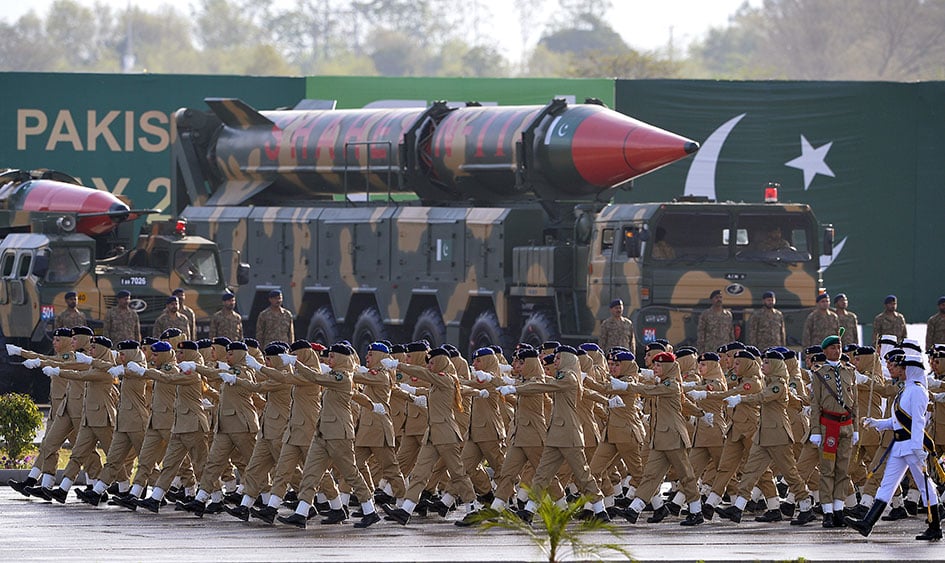PTBP Web Desk
The Pakistan Stock Exchange (PSX) witnessed a significant downturn on Monday as investors scrambled to offload their holdings, fearing a potential escalation of conflict in the Middle East.
The benchmark KSE-100 Index dropped nearly 800 points during intra-day trading, reflecting widespread bearish sentiment across key sectors of the market.
At 12:35 pm, the KSE-100 Index was hovering around 80,522.25 points, marking a decrease of 769.88 points, or 0.95%. The broad sell-off affected several crucial sectors, including automobile assemblers, cement, chemicals, commercial banks, oil and gas exploration companies, and oil marketing companies (OMCs).
Heavyweight stocks such as Mari Petroleum Company Limited (MARI), Oil and Gas Development Company (OGDC), Pakistan Petroleum Limited (PPL), Habib Bank Limited (HBL), MCB Bank (MCB), and Meezan Bank Limited (MEBL) all traded in the red, contributing significantly to the overall market decline.
Experts attributed the steep decline in the market to rising geopolitical tensions, particularly in the Middle East, where escalating conflicts have left investors on edge. The ongoing military actions and fears of a broader conflict in the region are weighing heavily on the local market. Investors, already anxious about the volatility in global markets, are opting to reduce their positions in an attempt to safeguard their capital.
The previous week saw a similar trend in the PSX, with the market remaining under pressure and closing in the red. Investors, concerned about the uncertain geopolitical climate and economic challenges, opted to offload their holdings at available margins. The benchmark KSE-100 Index plunged by 782.32 points on a week-on-week basis, closing at 81,292.13 points. Foreign investors also remained net sellers during the week, withdrawing $12.443 million from the local equity market.
Despite the challenging market conditions, Pakistan received a key financial boost last week in the form of the first tranche of Special Drawing Rights (SDR) 760 million, equivalent to $1.03 billion, from the International Monetary Fund (IMF). This inflow of funds was part of a broader agreement between Pakistan and the IMF aimed at stabilizing the country’s economy and addressing its structural weaknesses.
In a significant announcement on Sunday, Finance Minister Muhammad Aurangzeb stressed the need for comprehensive reforms to fundamentally transform Pakistan’s economy. The minister underscored the importance of changing the economic “DNA” of the country to ensure that the latest IMF bailout would be the final one Pakistan would need. Aurangzeb also called for a “nuclear war” against the cash-based economy, a key part of the reform package aimed at modernizing Pakistan’s financial system and enhancing transparency.
These reforms, while necessary for long-term economic stability, may contribute to short-term uncertainty in the market, as investors adjust to the new fiscal and monetary policies being rolled out by the government.
The PSX’s performance on Monday mirrored concerns seen across global markets, particularly in Asia, where share markets turned cautious amid ongoing conflicts in the Middle East. The geopolitical instability offset positive economic developments in China, where stimulus measures helped lift markets. However, these gains were tempered by concerns about Japan’s new prime minister’s stance on normalizing interest rates, which led to a decline in the Nikkei Index.
In China, the blue-chip CSI300 Index rose by another 3.0%, having already surged by 16% the previous week. The Shanghai Composite also climbed by 4.4%, building on a 13% rally from the previous week. These gains were driven by a rush of stimulus measures, which helped counterbalance a poor manufacturing survey.
Despite the continued Israeli airstrikes across Lebanon, which added to the overall geopolitical uncertainty, oil prices remained restrained due to concerns about increased supply. Investors globally are also looking ahead to key U.S. economic data expected later in the week, including a payrolls report that could influence whether the Federal Reserve opts for another significant rate cut in November.
In the PSX, several sectors that are critical to Pakistan’s economy were hit hard by the sell-off. Automobile assemblers, cement manufacturers, and the chemical sector all saw significant losses. The financial sector, represented by major commercial banks, also experienced a drop in stock prices. The oil and gas exploration sector, which includes major companies like OGDC and PPL, was particularly impacted due to concerns over fluctuating oil prices in the global market.
OMCs also faced challenges as investors moved to cut their exposure to stocks that could be affected by rising geopolitical risks and uncertainties about future oil supplies.
The market’s immediate outlook remains uncertain, with investors likely to continue reacting to developments in the Middle East and other global economic trends. The potential for further market volatility remains high, especially as Pakistan navigates its economic reforms and implements measures agreed upon with the IMF.
Experts caution that geopolitical risks will continue to dominate investor sentiment in the near term, but there are also opportunities for recovery if global conditions stabilize and Pakistan’s economic reforms yield positive results.
In the longer term, the successful implementation of the IMF-backed reforms could provide the foundation for more sustainable economic growth, which would likely translate into improved investor confidence and a more stable stock market. However, in the short term, the PSX will likely remain sensitive to both local and global developments.




